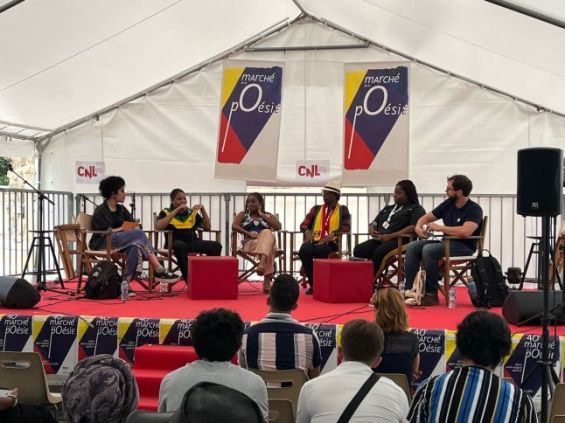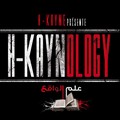The Moroccan writer and poet Abdellatif Laâbi expressed his «astonishment» after the organizers of the Poetry Market in Paris: reversed their decision to host Palestinian poetry as the guest of honor for the year 2025.
In a letter dated June 1, 2024, the author addressed Yves Boudier, president of the c/i/r/c/é association, the initiator of the event, as well as its general delegate, Vincent Gimeno-Pons. He recalled having received a letter himself on July 20, 2022, where the hosts expressed «unequivocally» their wish to welcome Palestinian poets, «in the same manner» as those «from Spain, Italy, Portugal, Estonia, India, Finland, Catalonia, Singapore, Luxembourg» had been received previously.
«I believe that the reasons you invoke to justify such a reversal are politically biased and morally unbearable. I expected more discernment and courage from you. Knowing Palestinian poets well, I can say with all tranquility that they are more humanistic than you and me. Their voices are indispensable to us. Your decision not to give them free rein next year will cast doubt on your good faith as organizers of the Poetry Market, and will jeopardize the very future of the latter», criticized Abdellatif Laâbi.
Political considerations
In a first letter addressed to the Moroccan writer, the organizers recalled having held «some events around Palestinian poetry», as well as around the personal work of the Moroccan author.
They also emphasized having «appreciated the high quality» of his Anthology of Palestinian Poetry, composed of texts gathered with writer and journalist Yassin Adnan, who publicly expressed his indignation at the cancellation. Furthermore, the c/i/r/c/é association expressed the wish that this work «be the subject of readings and meetings, in 2025, with some poets gathered in this collection». However, the author’s letter revealed that he received a new letter on May 30, 2024, announcing the decision to «indefinitely cancel» the initial invitation.
On the event’s social media, internet users have incessantly questioned the organizers, sharing the letter from the Moroccan author. For now, the host association has not reacted publicly.
So far, it mainly announces the program of the 41st edition scheduled from June 19 to 23, 2024, with Greece as the guest of honor. But in the last letter addressed to Laâbi, the association explicitly states avoiding turning the Poetry Market into a «political (and not poetic) platform», with «issues that would exceed [them]».
«The Poetry Market cannot take such a stance. We tried, last December, to organize a meeting between Israeli and Palestinian poets, but it proved impossible: the contacts we had taken on one side and the other refused to be present in the same space. The Palestinians (like the Ukrainians in relation to the Russian aggressors) oppose any meeting, even poetic, with their Israeli counterparts. This situation is obviously unfortunately not ready to improve in the coming times», the organizers wrote.
Making Palestinian authors heard under occupation
In the Gaza Strip, a recent report from the Palestinian Ministry of Health states that at least 36,479 have been killed and 82,777 injured in the bombings and offensives of the Israeli occupation since October 7, 2023.
The actual numbers remain significantly higher, given the number of missing persons or those still under the rubble, including women and children. In a context of total siege and unprecedented famine, children and the elderly are increasingly left for dead due to lack of food.
In a document, the UN special rapporteur on the Occupied Palestinian Territories described Israel's actions as genocide. Meanwhile, Netanyahu's government has been urged by the International Court of Justice (ICJ) to «ensure that its forces do not commit genocidal acts».
In this context, the Moroccan writer Khalid Lyamlahy told Yabiladi that «we must redouble our efforts to make Palestinian voices heard». A lecturer in Francophone literatures at the University of Chicago (United States), he shared Abdellatif Laâbi’s letter, considering that «the decision of the Poetry Market is shameful».
Lettre du poète marocain Abdellatif Laâbi aux organisateurs du Marché de la Poésie @MDLPParis qui reviennent sur leur décision d’accueillir la #poésie palestinienne en invitée d’honneur pour l'année 2025. Un grand merci à lui, l'auteur de 3 anthologies de #poésiepalestinienne ! pic.twitter.com/z8yP5m6HHz
— Khalid Lyamlahy (@khalidlym) June 1, 2024
In this regard, Khalid Lyamlahy himself works to give voice to Palestinian authors through reviews of collections, works by the country's authors, including Najwan Darwish (translated by Laâbi), Olivia Elias, and Raed Wahesh (translated by Antoine Jockey).
«It is increasingly vital to highlight the work of Palestinian poets and artists, especially internationally. In France, for example, the Palestinian question suffers from much misunderstanding, marginalization, and distortion. This is why I have focused, in my work, on French translations of Palestinian poetry. A way to address the Francophone readership.»
Contacted by our editorial staff, the author also believes that «today more than ever, we need to listen to Palestinian voices, share their texts, and amplify their testimonies». «Just look at the international echo that Refaat Alareer’s poem ("If I must die") has had, translated into several languages, to realize what a poem can do», he argued.
In this same vein, Khalid Lyamlahy argues that «more than ever», the Palestinian question «is a kind of ethical and political compass». «The reactions and the level of engagement of intellectuals, writers, and artists» regarding this subject «say something about the values that animate (or do not animate) their work», the author affirmed.





 chargement...
chargement...











